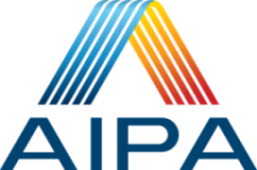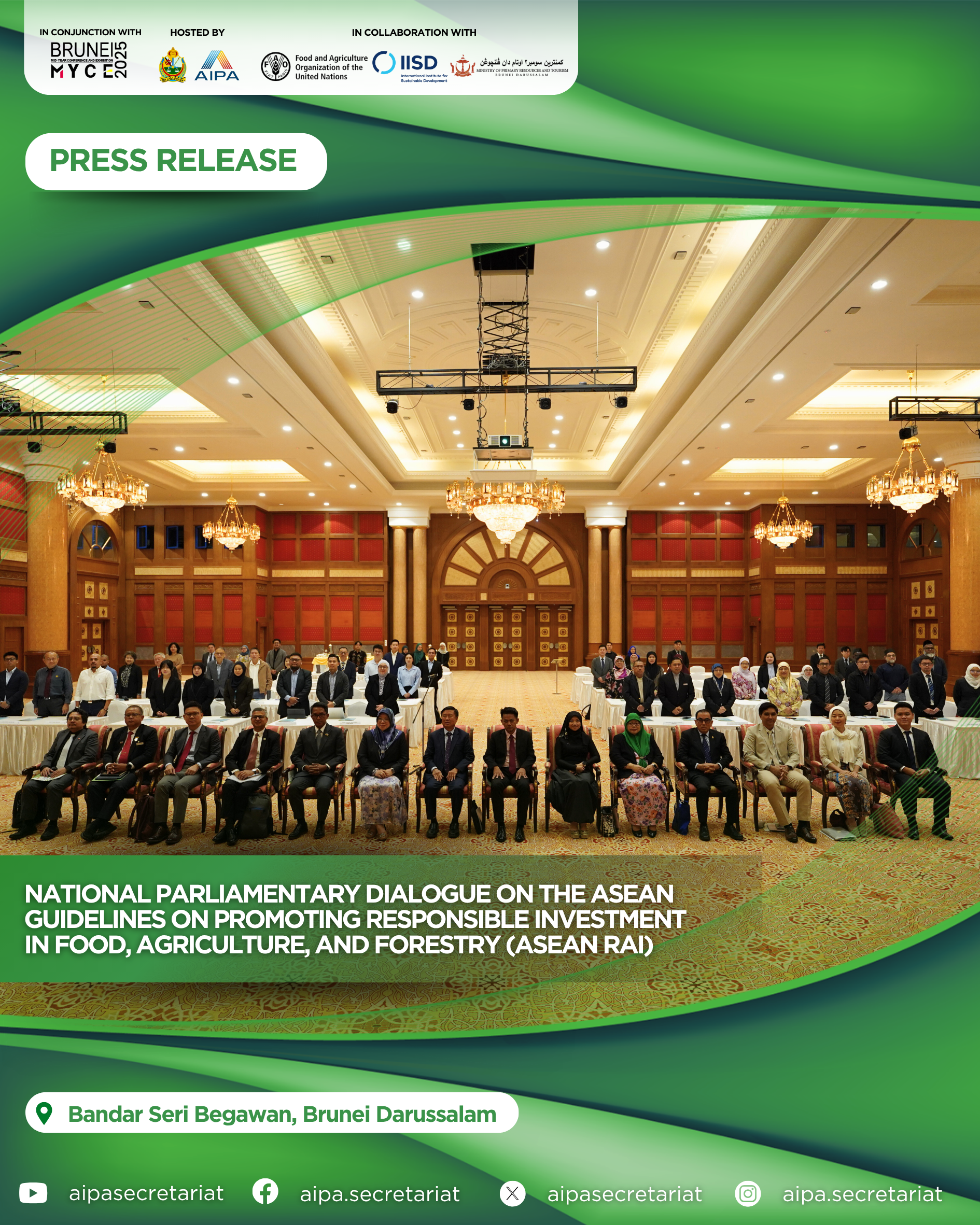NATIONAL PARLIAMENTARY DIALOGUE ON ASEAN GUIDELINES ON PROMOTING RESPONSIBLE INVESTMENT IN FOOD, AGRICULTURE AND FORESTRY (ASEAN RAI)
Bandar Seri Begawan, Thursday, 19 June 2025 – Efforts towards responsible and sustainable investment in the food, agriculture, and forestry sectors took centre stage at the National Parliamentary Dialogue on ASEAN Guidelines on Promoting Responsible Investment in Food, Agriculture and Forestry (ASEAN RAI), held at the Legislative Council Building, Brunei Darussalam. Jointly organised by the Legislative Council of Brunei Darussalam and the ASEAN Inter-Parliamentary Assembly (AIPA), and co-organized with the Food and Agriculture
Organization of the United Nations (FAO), the dialogue was held in collaboration with the Ministry of Primary Resources and Tourism (MPRT) and with the technical support from the International Institute for Sustainable Development (IISD). The dialogue convened over 70 participants including Members of the Legislative Council, government agencies, national stakeholders from the agriculture sector, academic institutions, private sector actors, and regional partners, including the ASEAN Secretariat.
Held in conjunction with the Brunei Mid-Year Convention and Exhibition (MYCE) 2025 under the theme of environmental sustainability, the dialogue aimed to enhance understanding among Members of Parliament and other national stakeholders on responsible agricultural investment, drive shared commitments, and build a stronger foundation for Brunei Darussalam and its regional partners in advancing an ethical, inclusive, and resilient agricultural sector.
The opening ceremony commenced with remarks delivered by representatives of the Legislative Council of Brunei Darussalam, AIPA, FAO, and the MPRT. The remarks underscored the shared commitment as a driving force to safeguard food security, societal well-being, and environmental sustainability. The success of ASEAN RAI implementation, it was stressed, hinges upon close collaboration among all stakeholders, including parliamentarians, government agencies, the private sector, and grassroots communities.
“This event today comes at an important time as countries in our region continue to find ways to strengthen food systems, protect natural resources, and ensure that investment in agriculture and forestry brings long-term value not just to the economy, but to people and the environment,” said Honourable Lau How Teck, Member of the Legislative Council of Brunei Darussalam “I wish to commend the Legislative Council of Brunei Darussalam for its active engagement in the formulation of this framework, and for its expressed its readiness to champion under Pillar 5, which is Stakeholder Collaboration, a pillar that reflects the spirit of today’s dialogue. This pillar underscores the importance of inclusive engagement and coordinated action in aligning with national development strategies,” said H.E. Siti Rozaimeriyanty Dato Haji Abdul Rahman, Secretary General of AIPA
“As highlighted in Asia and the Pacific – Regional Overview of Food Security and Nutrition 2023 by the FAO, transforming food systems requires whole-of-government, well-coordinated, integrated actions and investments.i To ensure long-term, sustainable benefits for both people
and the planet, these investments must also be responsible,” said Rajendra Aryal, FAO Representative in Indonesia and Timor Leste and FAO Focal Point for ASEAN.
“This dialogue comes at a pivotal juncture for Brunei Darussalam. As we continue to diversify our economy in line with Brunei Vision 2035, it is important to recognize that responsible investment in food sectors is both a necessity and an opportunity. Although the agriculture, forestry and fisheries sector may currently only contribute about 1.2% to our annual Gross Domestic Product in 2024, yet its strategic importance for food security, rural development, and environmental sustainability remains undeniable,” said Yang Mulia Dayang Hajah Tutiaty binti Haji Abdul Wahab, Permanent Secretary of Ministry of Primary Resources and Tourism (MPRT).
The first session focused on the fundamental concepts and progress of ASEAN RAI implementation at both the regional and national levels. Presentations were delivered by representatives from the FAO, ASEAN Secretariat, the Legislative Council of Brunei Darussalam, the National Assembly of Cambodia, and the Ministry of Primary Resources and Tourism, highlighting the urgent need for more inclusive and responsible investment in agriculture that is aligned with national priorities.
The panel discussion, moderated by FAO Focal Point for ASEAN, featured panellists including the Honourable Awang Lau How Teck, Member of the Legislative Council; Honourable Oscar Ling Chai Yew, Member of the House of Representatives of Malaysia; Yang Mulia Awang Hirman
bin Haji Abu, Assistant Director of Agriculture and Agrifood, Ministry of Primary Resources and Tourism; and Yang Mulia Awang Lim Jun Hong, Founder of Mori Farm. This session examined the challenges and drivers in implementing ASEAN RAI, and highlighted the importance of policy alignment, institutional support, and community engagement in strengthening responsible agricultural investment at both national and regional levels.
In the afternoon, participants visited two local farms: Hua Ho Agricultural Farm and Mori Farm, which provided an opportunity to observe sustainable agricultural practices in Brunei Darussalam.
Download for PDF
Download for PDF
Date:
July 7, 2025



